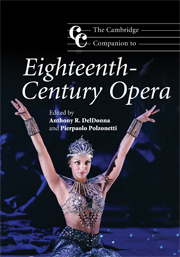Book contents
- Frontmatter
- Part I The making of opera
- Part II National styles and genres
- 9 Genre and form in French opera
- 10 Genre and form in German opera
- 11 Opera in eighteenth-century England: English opera, masques, ballad operas
- 12 Opera in Naples
- 13 Portugal and Brazil
- 14 Opera, genre, and context in Spain and its American colonies
- Notes
- Bibliography
- Index
10 - Genre and form in German opera
from Part II - National styles and genres
Published online by Cambridge University Press: 28 September 2011
- Frontmatter
- Part I The making of opera
- Part II National styles and genres
- 9 Genre and form in French opera
- 10 Genre and form in German opera
- 11 Opera in eighteenth-century England: English opera, masques, ballad operas
- 12 Opera in Naples
- 13 Portugal and Brazil
- 14 Opera, genre, and context in Spain and its American colonies
- Notes
- Bibliography
- Index
Summary
On the evening of October 6, 1752, a Leipzig theater audience witnessed a momentous occasion in the history of German opera: a performance of Johann Georg Standfuss's newly composed Der Teufel ist los, which was greeted with riotous applause and loud shouting from the crowds. This tumultuous reaction both affirmed the work's success and served to disprove and defy theater critic Johann Christoph Gottsched, who had attempted to remove the work from the stage, primarily with allegations of indecency. Unable to accept public defeat, Gottsched subsequently sparked The Comic War, a lively pamphlet exchange debating the merits and shortfalls of comic opera. The popular acclaim of Der Teufel ist los, however, ensured its presence on German stages well into the 1760s, and by 1770, composer Johann Adam Hiller retrospectively honored Standfuss as the first composer of German comic opera. The aforementioned 1752 Leipzig audience thus witnessed both the inauguration of a German operatic tradition and the very performance that sparked a lengthy document concerning the genre. Although Standfuss's opera certainly stands at the center of the debate, The Comic War is a fascinating document that reveals a wide variety of contemporary theatrical traditions performed across the German territories. In short, Der Teufel ist los is discussed not only as a distinctly German opera, but also as it relates to the Italian, French, and English operatic traditions. For example, The Comic War alleges that the star soprano, Madame Steinbrecher, sang in the Italian bel canto style in a manner similar to the trained singers of the Locatelli travelling troupe.
- Type
- Chapter
- Information
- The Cambridge Companion to Eighteenth-Century Opera , pp. 184 - 201Publisher: Cambridge University PressPrint publication year: 2009
- 1
- Cited by

